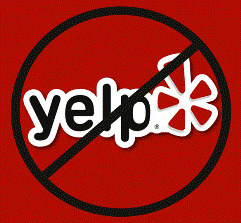September 7, 2014, - 8:57 pm
Federal Court Decision Makes Yelp Completely Untrustworthy & Here’s Why
If you’ve ever trusted ratings on Yelp, here’s why you shouldn’t: some federal judges ruled that the online rating site is allowed to manipulate and lower the ratings of businesses that don’t pay Yelp to advertise on the site.

Late Senator Daniel Patrick Moynihan once said that while you are entitled to your opinion, you are not entitled to your facts. But, now, Yelp has gotten a federal appeals court judge to allow Yelp to lie about opinion, and, therefore, create its own facts. The Federal Court of Appeals for the Ninth Circuit in San Franciso says Yelp is allowed to lower and manipulate ratings of businesses that don’t advertise on Yelp. The Appeals Court judges said that no laws are broken if Yelp lowers and/or manipulates the ratings of non-advertising businesses. I guess the judges never heard of “truth in advertising” laws, laws against fraud, and consumer protection laws–all of which are broken if Yelp is doing this.
Businesses alleged the San Francisco company manipulated their ratings on Yelp to extort them to buy ads. Yelp denies advertisers get more favorable treatment on its popular review service. It says its software that filters reviews to determine ratings does not distinguish between those who advertise and those who don’t. The 9th U.S. Circuit Court of Appeals in San Francisco ruled this week that it doesn’t matter anyway.
The plaintiffs did not prove that Yelp broke any laws, the court ruled. Even if Yelp does manipulate reviews, it does not constitute extortion, it said. “As Yelp has the right to charge for legitimate advertising services, the (alleged) threat of economic harm that Yelp leveraged is, at most, hard bargaining,” Judge Marsha Berzon wrote for the three-judge panel in Tuesday’s ruling. . . .
“We are obviously happy that the court reached the right result, and saw through these thin attempts by a few businesses and their lawyers to disparage Yelp and draw attention away from their own occasional negative review,” Yelp wrote in a blog post.
The appeals court upheld a federal judge’s dismissal of the proposed class-action brought by the small business owners. They claimed Yelp sales representatives told them their ratings on the service hinged on buying advertising. The business owners said positive reviews disappeared from their Yelp page and their overall rating fell or a negative review reappeared on the page after they declined to buy ads from Yelp.
If Yelp truly doesn’t manipulate ratings based on advertising with the company, then why did it make the argument which the judges adopted: that even if it does change the ratings, no laws are being broken?
Maybe because that’s what actually IS happening on Yelp. From my own experience that’s been the case. I’ve posted positive reviews on Yelp for a very few businesses that I patronize and which provide very good service. Every single one of my reviews has been “filtered” out and not counted into the ratings of the businesses, while all of the negative reviews remain in view and counted toward the overall low ratings the businesses have. “Coincidentally,” none of these businesses advertises on Yelp.
See the correlation here?
Now that Appeals Court Judges in San Francisco came out of the closet and said cheating this way is okay for Yelp, the extortion and manipulation will continue. I, for one, will never take Yelp seriously. I will always wonder how many positive ratings and comments were filtered out because the business doesn’t pay Yelp to advertise. And how many negative ratings and comments were filtered out because the business does advertise on Yelp. I won’t put any faith in Yelp ratings.
And neither should you.
By the way, if federal judges had to run for re-election and they were rated on Yelp, I guarantee this ruling would have been completely different.
Sadly, they have the job for life and, therefore, don’t have to care what you think of them.
So, Yelp has the last laugh, unless these businesses in the class action appeal the decision of the People’s Republican of the Ninth Circuit of San Francisco to the U.S. Supreme Court.


In a way the decision makes sense, because ruling against Yelp could open a slippery slope.
Newspapers’ editorial policies have been influenced by advertisers for years and years. The content of college courses is influenced by donors, e.g. Arab donations. As the news indicates, the same is true of a number of think tanks.
Politicians say what the lobbyists tell them to say. Accountants say what their clients tell them to say. Same is true for most lawyers (present company excluded).
Doctors’ decisions will be influenced by Federal policy rather than medical judgment more and more.
None of this is right, but it is where we are. In a sense, a decision against Yelp could have tremendous consequences. Needless to say though, it is a bizarre decision, and highlights the corruption inherent in so many aspects of society.
Little Al on September 7, 2014 at 9:44 pm